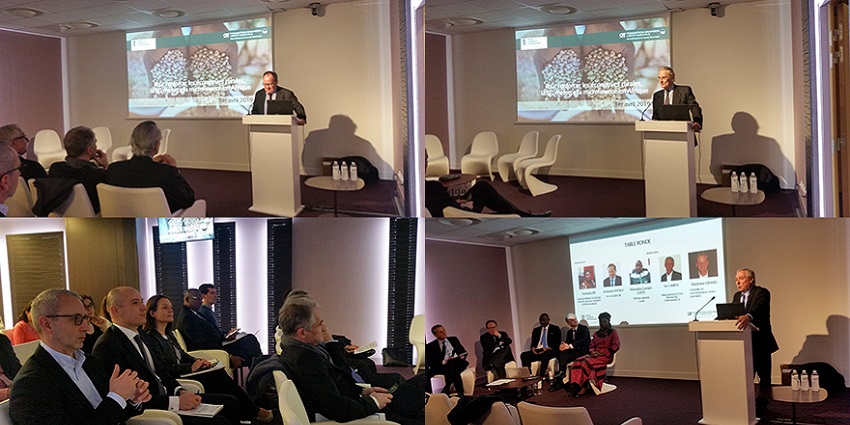
On April 1, the Grameen Crédit Agricole Foundation and the European Investment Bank (EIB) organised, in Paris, a round table debate on the subjectf of the development of rural economies and the strengthening of microfinance in Africa by the EIB. The representatives of both institutions stated a common objective: the promotion of a more sustainable and inclusive economy.
Following the EIB’s grant to the Foundation of a EUR 12 million loan equivalent in CFA francs to support microfinance in West Africa, this round table was also an opportunity to discuss the challenges related to the development of rural areas in Africa. Several guests gathered to discuss rural microfinance, agriculture, gender and climate change.
For the Foundation, the acknowledgement of its expertise in microfinance
As Jérôme Brunel, Director of the Foundation and Secretary General of Crédit Agricole S.A., pointed out in his opening speech, the Foundation has lent more than four times its capital over the past ten years, i.e. €200 million in financing, in over 30 countries and has supported over 100 partners since 2008. At the end of 2018, the Foundation had an outstanding portfolio of €76 million and supported 75 partners in 35 countries. After excellent results in 2018, this new funding will allow the Foundation to extend its action in Africa in the field of microfinance and support to social entrepreneurship. “With this funding to the Grameen Crédit Agricole Foundation, the European Investment Bank confirms its commitment to financial inclusion in West Africa alongside a committed player that has just celebrated its 10th anniversary,” stated Ambroise Fayolle, EIB Vice-President.
Mamadou Lamine Gueye, Managing Director of Caurie Microfinance, a Senegalese microfinance institution partner of the Foundation and beneficiary of the EIB funding, and Soukeyna Ndiaye Bâ, Managing Director of the INAFI International Foundation and a Board member of the Foundation, for their part, spoke of the importance of intermediaries such as the Grameen Crédit Agricole Foundation, whose positioning enables small microfinance institutions to be funded, which otherwise would not be as they are not eligible for funding from large donors. Both agreed to recognize the role of the Foundation and other donors in the development of the African microfinance sector, hence providing opportunities for African youth.
Two institutions have already benefited from the loan granted by the EIB to the Foundation: Caurie Microfinance, whose mission is the social and economic empowerment of poor microentrepreneurs in Senegal, mainly women; and PAMF BF, which offers microloans to finance agricultural and economic activities such as market gardening or cereal production in Burkina Faso. These two institutions alone represent over 110,000 active borrowers, 79.87% of them women.
Africa remains a priority target for the Foundation
Sub-Saharan Africa accounts for around 30% of the Foundation’s funding. It focuses its action in favour of rural populations, with the objective of strengthening the resilience of the agricultural sector. “The Grameen Crédit Agricole Foundation is now present in a dozen African countries,” stated Jean-Marie Sander, President of the Foundation. For Eric Campos, Managing Director of the Foundation, “work on agriculture means to work on the future of Africa. We must free the development of products suited to the rural world: today, agriculture represents 60% of the workforce of the continent. Farmers represent only 3% of the banks’s clients!”
In line with the action undertaken by the Foundation, microfinance is a fundamental pillar for value creation in Africa. This is also what two of our speakers, Flora Helard and Mathilde Thonon, students at Sciences Po Paris and co-founders of In-Venture, found out during their one-year voyage accross West Africa and South-East Asia where they travelled to meet those who find financial solutions to the social and environmental problems of their community. In particular, they met with two MFIs partner of the Foundation in Benin: RENACA and ACFB. Their enthusiasm reflects the performance of a dynamic sector that attracts tomorrow’s young entrepreneurs.